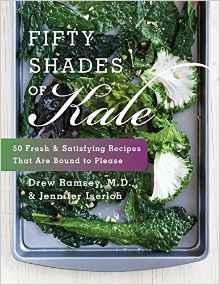Well, if that title doesn’t catch your attention, then I don’t know what will.
Last weekend while attending a produce conference in San Antonio, Texas, I was able to meet and hear Drew Ramsey, M.D., who co-authored the cookbook “Fifty Shades of Kale.” His day job is as an assistant clinical professor of psychiatry at Columbia University in New York City. He is also a leading proponent of eating for brain health.
After hours, he is better known as the co-founder of National Kale Day, which is celebrated every year on October 5.
Dr. Ramsey’s premise is that if you choose foods that feed your brain (admittedly the most important organ in your body), it will help ensure a well-functioning body and predict your current and future health.

Highlights from his talk:
- Kale is great because of the “Rule of Kale”: nutrient density, flexibility, and availability.
- Your brain needs fat. That’s one of the reasons nuts are good for you. Twenty-three almonds are the perfect serving.
- Eat seafood that contains omega-3 fats; wild salmon (not farm-raised) is high in B12, vitamin D, zinc, iodine, and chromium—all important nutrients.
- Six oysters are a perfect serving and only contain 57 calories.
- Good gut health means good brain health, so fermented foods like kimchi and probiotics help your gut.
- Cut out processed foods.
- Count brain nutrients, not calories.
- Top sources of iron: clams, liver, cashews, pumpkins seeds, and dark chocolate! (He got a quick round of applause on that last one.)
Dr. Ramsey talked about the top 11 food plants, in terms of nutrient density. It’s not a surprise that most of them are trending and showing up more often in produce departments and on top restaurant menus:
- Maroon carrots
- Spinach
- Red cabbage
- Garlic
- Peppers
- Broccoli
- Asparagus
- Lemons
- Strawberries
- Brussels sprouts
- Kale
In case you’re wondering how kale got to be so “suddenly popular,” here is “The Rise of Kale,” according to Dr. Ramsey:
- 1996 The Los Angeles Times publishes a poem dedicated to the leafy green, entitled “Oh Kale”
- 2001 Bo-Mueller-Moore creates 1st Eat More Kale T-shirt
- 2008 Whole Living deems kale a “powerfood”
- 2008 539 babies in the United States were named Kale
- 2009 Brad’s Raw Food Kale Chips launched
- 2010 The kale salad at Northern Spy in New York City inspires a New York Times kale salad recipe
- Archeological evidence of kale eaten in ancient Rome
- 2012 Bon Appetit magazine names this the “Year of Kale”
- 2013 First annual National Kale Day
- 2014 Kale backlash begins
- 2015 Kale served to 650,000 students in 2,500 public schools on National Kale Day
- 2016 McDonald’s starts offering a kale salad
Dr. Ramsey is a prolific writer and his byline appears regularly in The New York Times, The Huffington Post, The Wall Street Journal, The Atlantic, and Men’s Journal. He has a new book coming out next month, “Eat Complete: The 21 Nutrients that Fuel Brain Power, Boost Weight Loss and Transform Your Health.”
What I liked most about Drew is that he is approachable, humble, married with two young children, and is sincerely passionate about his work. After his talk, I listened to him patiently answer question after question from audience members who had individual, personal, health questions.
I already pre-ordered his book. And I have made some changes and tweaks to my diet to add more good fats. Thank goodness I already eat a diet rich in his top 11 plant foods.
How about you?
Karen
P.S. Here is a photo of Dr. Ramsey and me after his talk.






